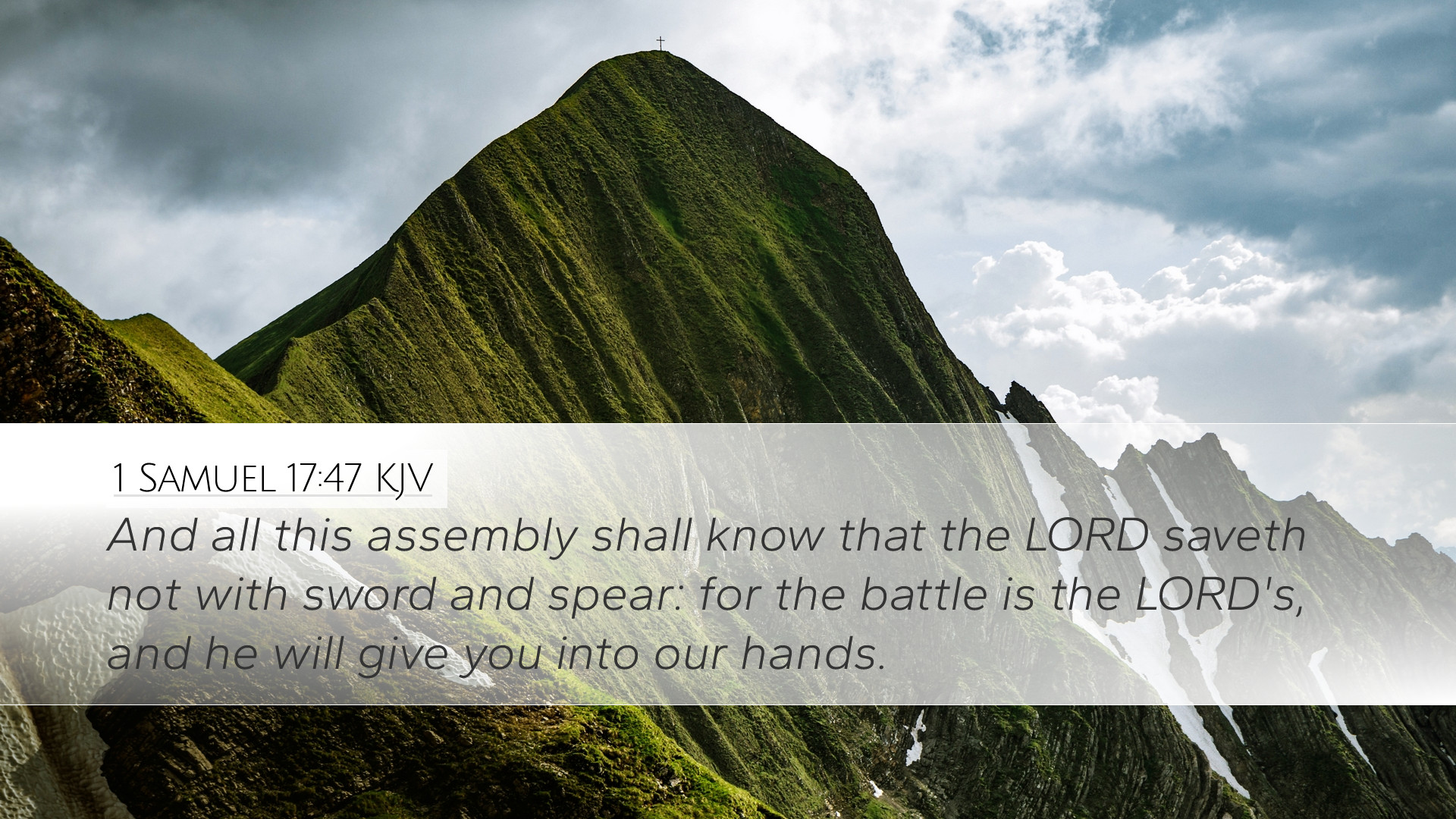Commentary on 1 Samuel 17:47
Verse Text: "And all this assembly shall know that the LORD saveth not with sword and spear: for the battle is the LORD's, and he will give you into our hands."
Introduction
This verse comes from the well-known narrative of David and Goliath, a pivotal moment in the history of Israel, showcasing David’s faith and God's power. It serves as a conclusive statement by David before he confronts Goliath, emphasizing the profound theological point that the victory in battle belongs to the Lord, not to human weapons or might.
Theological Insights
-
The Nature of Divine Sovereignty:
David asserts the sovereignty of God over earthly conflicts. This reflects the truth expressed in multiple scriptures that God is the ultimate source of victory. As Matthew Henry states, true faith recognizes that God’s aid does not depend on human strength or military might, for the battle is ultimately the Lord’s.
-
God's Deliverance:
Albert Barnes highlights the assurance that God saves in His manner, which contradicts worldly expectations. The phrase "the battle is the LORD’s" reinforces that while the world may rely on physical prowess, God's intervention transcends human capabilities, often dealing with situations in unexpected ways.
-
The Role of Faith:
Faith plays a crucial role in David’s declaration. Adam Clarke notes that David displays an unshakeable trust in God, which stands in stark contrast to the fear displayed by others in Israel. This moment serves not just as a challenge to Goliath but also as an exhortation to the people to put their confidence in God.
Contextual Analysis
To fully understand 1 Samuel 17:47, we must consider the surrounding narrative. The Israelites were faced with a formidable foe, Goliath, who represented not just a physical threat but a challenge to their faith and identity as God’s chosen people. David’s anointing as king had come amidst a culture of fear, showcasing a symbolic shift towards reliance on divine strength.
Historical Context
This confrontation occurs during a time of conflict between the Israelites and the Philistines. The Israelites were in a state of paralysis, fearing Goliath's taunts. David’s act of boldness was grounded in his experiences as a shepherd, where he had seen God deliver him from dangers. This historical backdrop adds depth to David's confidence. It reiterates that Israel’s God is not confined by human limitations.
Literary Elements
The poetic structure of David’s statement stands out as he employs a clear declaration of faith contrasted with the Philistine's reliance on weapons. This literary flair serves to highlight a larger theme throughout Scripture: the dichotomy between human arrogance and divine providence.
Clarke emphasizes that David's words encapsulate a prophetic understanding that God fights for His people. The assertion that "all this assembly shall know" emphasizes the communal aspect—victory would serve to bolster the faith of Israel as a nation, reinforcing their covenant identity.
Practical Applications
-
Encouragement in Trials:
For pastors and leaders, this verse serves as a reminder to trust in God during challenging seasons. The acknowledgment that “the battle is the Lord’s” invites believers to surrender their anxieties and fears, knowing that the outcome rests with God.
-
Community Trust in God:
This verse encourages church communities to unite under the banner of faith. In times of congregational struggles or societal challenges, recalling that God fights for His people can inspire unity and collective action grounded in trust.
-
Faith Over Fear:
Students and theologians can reflect on how David’s faith serves as a model against cultural pressures that oppose belief. Emphasizing that faith does not depend on visible resources reminds believers to look beyond their circumstances to God's power.
Conclusion
1 Samuel 17:47 succinctly encapsulates a profound theological truth: the battles we face are ultimately the Lord’s, and He alone provides victory. This perspective challenges individuals to confront their giants with faith, encouraging communal reliance on God's omnipotent ability to save. As Matthew Henry, Albert Barnes, and Adam Clarke collectively illustrate, this message resonates through the ages, reminding us that true salvation and deliverance come from our steadfast Lord.


